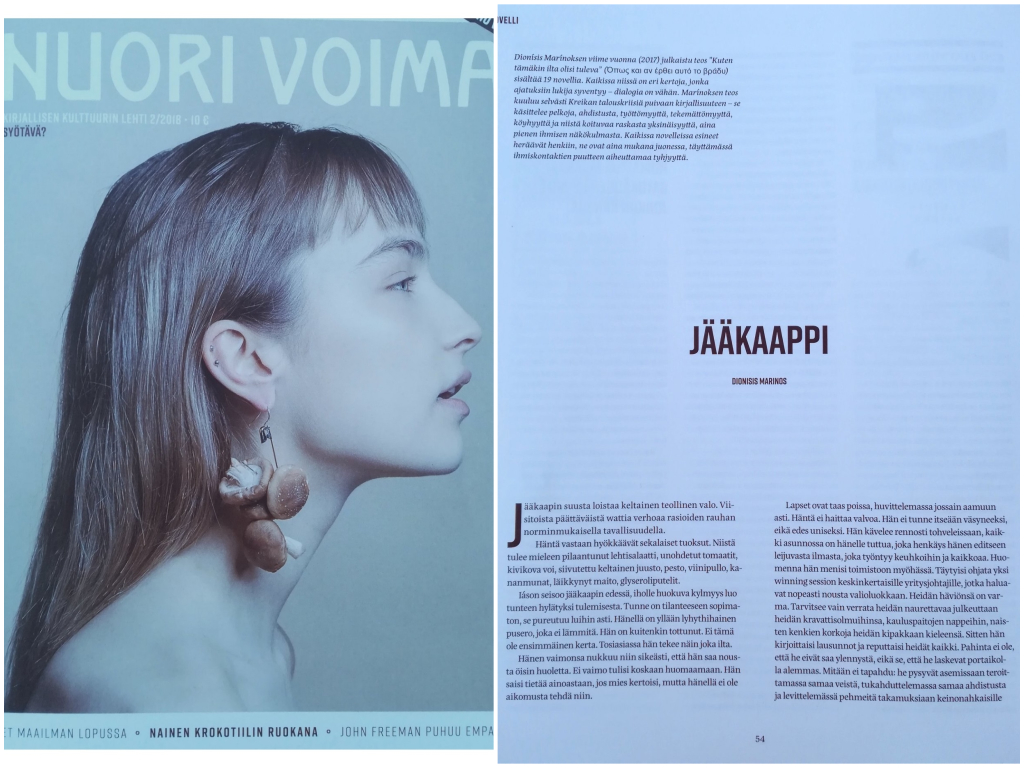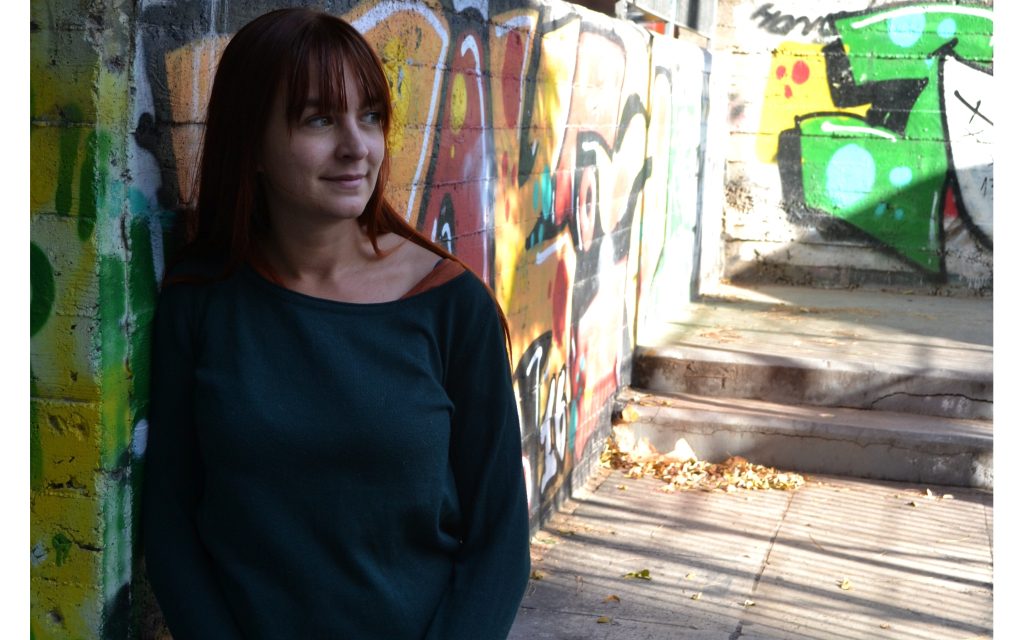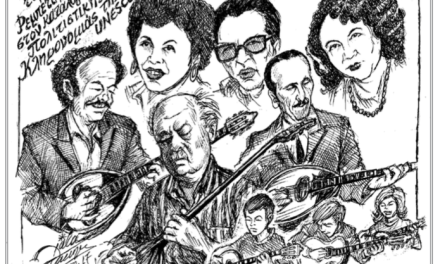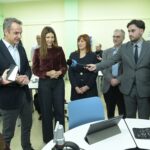Riikka Pulkkinen studied Finnish Literature at the University of Jyväskylä (2005-2010) and has a master degree in Comparative Literature [her thesis is titled ’The experience of urbanization in the short stories of Konstantinos Chatzopoulos’]. In 2007-2008 she studied at the Aristotle University of Thessaloniki as part of her Erasmus Program. She also studied at the Autonomous University of Nuevo Leon, Monterrey, Mexico (Jyväskylä University scholarship) in 2009 and at the Masaryk University, Brno, Czech Republic in 2010. She did her practice at the Finnish Institute of Athens, under the supervision of Maria Martzoukou (2012 – Erasmus scholarship, 2016/2017 – CIMO scholarship).
In 2014 she participated in the debate on modern Greek literature at the Helsinki Book Fair. In 2017-2018 she received a scholarship to attend the Education and Vocational Training Program for Young Modern Greek Language Translators (Kostas and Eleni Ourani Foundation – Haris Petrou Foundation). In September 2017 she created www.nykykreikkablog.com, where she publishes Greek literature translations, writes articles and introduces Greek writers to the Finnish audience. Within the framework of promoting young Greek writers she published the short story Ψυγείο [Fridge] by Dionisis Marinos in the literary magazine Nuori Voima in spring 2018.
Riikka Pulkkinen spoke to Reading Greece* about her interest in the Greek language and more specifically in the translation of modern Greek literature. She discusses the profile of Finnish readers that opt for Greek literature, noting that although there are many Finnish books translated in Greek, modern Greek literature is almost unknown in Finland both due to the decline of modern Greek studies and the suspension of the Greek translation funding program. She also comments on the challenges a translator may face when translating literature from Finnish to Greek and vice versa, as well as on the differences between the two societies, which are in turn reflected on culture and literature in specific, concluding that “indeed the two countries are unsettled and in a constant path of change, yet I am not sure where they are heading”.
What motivated you to turn to the Greek language and more specifically to the translation of Greek literature?
I have always been interested in letters and thus started studying Finnish Literature at the University of Jyväskylä. In the meantime, I came in touch with the Greek language and I was really drawn to it, self-taught at first, attending courses afterwards. So I ended up spending a year in Thessaloniki, where I had a crash course in Greek in parallel with my studies in English literature during my Erasmus. At that time I wasn’t able to read a whole novel in Greek. I then decided to continue my studies in Finland, where there were no Greek literature classes available so I petitioned for a free moving excange at the Masaryk University in Brno, Czech Rebublic, where I attended my first modern Greek literature courses. I had my master at the University of Helsinki, where together with comparative literature I also completed the courses corresponding to a modern Greek literature degree, some of them in Athens.
I have always been drawn to translation, so I also took translation courses. Yet, I had difficulty choosing what to read, as well as communicating with publishers. There was no interest whatsoever at the time. So I heard of the Education and Training Program for Young Modern Greek Literature Translators funded by the Petros Haris Foundation and the Kostas and Eleni Ourani Foundation, which has been operating since 2012 under the aegis of the Academy of Athens and I was lucky enough to be accepted. I reckon that this was the opening I needed to get to know the world of Greek books and their writers. I now know I am on the right track and I feel much more confident in what I do. Unfortunately the program didn’t took place this year.

You have recently created www.nykykreikkablog.com, which focuses on Greek literature in Finnish. How did you decide to embark on such a venture? What is its appeal to Finnish readers?
The idea came up last September when I started the aforementioned program of the Academy of Athens. Some other fellow students had started publishing their translations online, which was a good idea for a language like Finnish. At first, I thought it would be a kind of portfolio which would present Greek writers to Finnish publishing houses; yet, just a few months later, the blog attracted readers who were interested in Greece in general and my website was actually their only access to modern Greek literature. I often receive messages asking me where they can find the whole books or when the books will be published. Every proposal I make is accompanied by information on the writers and their works in their entirety so that publishers have access to more options. My aspiration is to cover more literary categories, which is quite a demanding task.
I am currently discussing a few books with some publishers. Some of them are quite interested, yet the difficulty lies in the fact that there are no translations available. I am running a blog fully aware of the challenges, and I try to present Greek writers and part of their work in Finnish so that they are known by Finnish publishers. It’s really interesting that many readers follow the site and express their interest to read more Greek writers and their books. What is actually missing is the publisher. Yet we are on track!
What do you reckon is the profile of the Finnish audience that reads Greek literature? And, in turn, what is that makes Finnish literature appealing to Greek readers? Are the major differences that exist between the North and the South reflected in what readers in both countries opt for?
I can think of three types of readers: those interested in ancient Greece, who are willing to know modern Greece as well, those travelling to Greek islands in the summer and enjoying the Greek landscape, and those, maybe younger ones, who have discovered Athens and are more interested in its urban landscape. Finnish people read a lot of literature from all over the world: in 2014, for instance, the Finnish population of 5.5 millions borrowed 91 million (!) books from public libraries, a figure that corresponds to 16.76 books per citizen.
There is of course a literature that is read because it comes from a specific place or because it focuses on specific issues; but there is also a literature that readers opt for regardless of the author’s origin. Maybe this kind of literature is easier to translate all over the world given that cultural and historical elements are often considered a burden, unless the way of writing is so attractive that the topic of the book is no longer what is advertised!
There are remarkable differences between Greece and Finland in this respect. First of all, there have been more than 10 years since a Greek book was translated in Finnish. In mid-1990s, thanks to the translator Reija Tanninen and the translation funding program of the Greek Ministry of Culture, some Greek books, such as part of Karyotakis’ and Engonopoulos’ works, were actually translated. At the same time the Finnish Institute of Athens supported the publication of a Greek short story anthology. Yet, when the translation funding program was suspended, there were no more publications.
In contrast, there are many Finnish books translated in Greek. Let me quote Aimilios Solomou and his research on the issue: “It’s strange that in a country that loves books, modern Greek literature is completely absent. The respective authorities are mostly to be blamed for the situation. It should be noted that until 1987 there were no translations of modern Greek poetry in Finnish (!) […] as Kimmo Granqvist eloquently put it, till the early 1990s “the majority of translations were based on a mediate language, especially French, English and Swedish”. This rather disappointing situation changed shortly afterwards when modern Greek studies flourished in Finland, with the cooperation of academics, modern Greek teachers and students. In late 1990s translations were finally based on the Finnish text itself. Yet, this considerable effort came to an abrupt end due to the decline of modern Greek studies and the suspension of the translation funding program”.
It is indeed quite difficult to establish a substantial communication between the two countries when such an effort isn’t supported at a university level. In Finland there are no more modern Greek language courses every year (only the basic language course is left, when there are enough students), while in Greece there was never a Finnish Literature department. Thus, there are no culture ambassadors, just scarce personal initiatives, as is the case of Maria Martzoukou, or myself that I am just starting my career on modern Greek literature; and the path is definitely quite a challenging one.
Yet, there are so many reasons for the two countries to establish such a communication. They both have a similar geographical location, no matter how different the weather is. It is exactly this location that has influenced the history and politics of the two countries in a comparable way. They both share similar war experiences, they suffered a civil war and all the divisions that such a war may leave behind, they are both small EU countries with a rich culture, yet a bit isolated from the rest of the world. I also reckon that arts also focus on similar topics – it is often argued that in Greece the current generation of authors writes about the civil war, and the same goes for Finland. The Finnish Institute of Athens is currently organizing an exhibition on the civil wars of both countries, as well as Spain.
I believe that such experiences should be shared through literature, without, however, disregarding the current situation in both countries. Greece is nowadays struggling with the crisis, as did Finland in the 1990s. Such experiences leave their mark and influence lives and families, which is, in turn, reflected on culture. Historical and social novels are quite popular in Finland as well. A case in point is Where Four Roads Meet by Tommi Kinnunen [Το σταυροδρόμι, Εκδόσεις Ουτοπία, translated by Maria Martzoukou] that sold 40.000 copies in Finland and will be published these days, which revolves around the same issues as Gkiak by Dimosthenis Papamarkos, which has also sold 40.000 copies in Greece. In Finland there have always been the classical studies and everybody knows something about ancient Greece; yet modern Greece has not attracted so much attention. Thus, it’s something quite unknown yet. And there are also a lot of people who would like to know more about the crisis and the respective developments.
Most scholars reckon that the content of a book cannot be separated from the particularities of the language that gave it shape. In this context, what are the peculiarities of translating literature from Finnish to Greek and vice versa?
Both languages have a special way of creating puns and I have noticed that their translation requires a deep knowledge of both languages. The text of course has to change a lot. In both languages, dialects are frequently used in literature and rendering their meaning is quite impossible – a soldier from Messolonghi cannot speak the same way as my grandfather on the eastern part of Finland. These elements constitute a major challenge for the translator, and unfortunately the translation often becomes problematic.
What’s also common in both languages is the use of notions that have no equivalent in the other language. In Greek, for instance, there are many traditional objects as well as words related to the orthodox church: τσολιάς, μπρίκι (a kind of coffee pot), the difference between a traditional coffee house (καφενείο) and a café, the tavern and beverages in bulk, traditions related to the Orthodox Easter, the carnival, the junk dealer (παλιατζής), λαχειοπώλης (a person who sells lottery on the street)…In a short story I recently translated I realized that the fact that the main character smoked a hand-rolled cigarette would create a completely different image to the Finnish, so I had to figure out a solution. Nikos Houliaras has written about those twists of luck: “such a strange thing luck is that it’s not at all weird that those who usually sell lotteries out on the streets are, as a rule, people injured by it”. (A story of the long winter, Nefeli, 1990). This image is difficult to be understood by someone who has never seen a Greek lottery seller in person.

In turn, in Finnish, we have many objects that are used for snow: tools to remove ice from cars, others to shovel the snow and clean our yards; there are various games that don’t exist in Greece as well as many references to the Finnish mythology (Τhe Kalevala, translated by Maria Martzoukou), which is less known internationally compared to Greek mythology; there are so many things in forests that have no name in Greek. In addition, the longer day of the year in late June has a completely different meaning to Finnish people. All these elements should be taken into consideration when translating, and not just οn linguistic terms. At a linguistic level, for instance, a thorny issue relates to fish! In Finland there are more freshwater fish, while in Greece some fish that abound in seas, may have no name in Finnish!
There is undoubtedly a stereotyped perception of Greeks abroad. Could literature be used to shake off these stereotypes and help form a new narrative about the country?
I am not sure this is the case anymore. Maybe this stereotyped perception has been related to a Cretan man like Zorbas, but this is not the dominant perception anymore. Greek people travel a lot and I am sure that Finnish people have met someone that proved that such stereotyped perceptions are not prevailing. During the first years of the crisis, Greek people appeared quite a lot in the Finnish media as well, yet even then, no new stereotypes were formed. Instead I personally saw a battle: some wanted to present the Greek people as rich and easy going, while others opposed such arguments by showing the real situation in the capital’s streets. The general perception nowadays is that the Greeks are undergoing harsh times; it becomes evident every time I discuss the Greek issue with a Finnish.
One of the reasons why Greece has attracted so much attention is exactly this battle. And this is where the voice of young Greek writers should be heard. Art has always constituted the most substantial means of communication among civilizations and its counterbalance is more necessary in the last decades than ever – and this is not only the case for Greece and Finland. I believe that the human voice should be heard, and this is exactly what literature does. I cannot say for sure which is the narrative that young writers would want to form about the country – and I am sure that there are major differences of perception among artists – yet what is important that they are heard to counterbalance impersonal statistics and news that just scratch the surface.
It seems that Greek and Finnish society differ in terms of their experience of modernity, their conception of family values and personal mentality. Yet a critic would argue that values are liquid and unsettled in both societies. Would you like to comment?
There are major differences indeed. Finland is considered a pioneer vis-a-vis technology, which is imprinted in cities, schools, houses…Things that don’t yet exist in Greece are considered self-evident to the Finnish. Children have entered the digital world to a greater extent compared to Greece; primary school children have their own smartphones and this is actually commonplace. In Greece, there are still blackboards and chalks. It’s a matter of personal preference which way you think is better, yet I personally feel relieved that things have not yet moved so fast in Greece.

There are also major differences as far as the family is considered and this is much related to the state. Although I cannot refer to official statistics, I reckon that family ties are much tighter in Greece, with grandparents actively participating in children’s lives. The three generations seem to be closer and spend much more time together. Let’s take a square in an Athenian neighborhood for instance. Children are in the same place as adults; a playground, a grandparent’s traditional coffee shop, a mum’s café, a ball-playing screen for dads and uncles, all co-exist in the same square and communicate with each other. Some children may have come with their parents and others with a grandparent. There are no such places in Finland. Already in early adulthood, the Finnish start an independent life, both on financial (state aid) and more general terms. And when they create their own families, grandparents play the role not so much of a basic family member but of a beloved visitor. In Finland the three generations lead quite distinct lives: children play at playgrounds in the presence of their mothers, adults hang out in places where children may not be allowed to enter, while the elderly have their own lives and it’s really unusual to live with their children. The state is organized in such a way so that a grandmother doesn’t need to pick her grandchild from school – and maybe this is why she doesn’t do it even if she wanted to; it’s quite unusual.
Such differences exert a considerable influence both at a personal and interpersonal level. Finnish people are used to be more autonomous, even lonely in family and working issues and they are quite unwilling to ask for help. I’m not sure if Finnish people themselves believe so, but after being in Greece for some years, the difference is quite intense. The same goes for their openness to discuss and share their personal issues.
Indeed the two countries are unsettled and in a constant path of change, yet I am not sure where they are heading.
*Interview by Athina Rossoglou
TAGS: LITERATURE & BOOKS | READING GREECE


![Literary Magazine of the Month: [FRMK] and its Ten-Year Anniversary Issue ‘Tenderness-Care-Solidarity’](https://www.greeknewsagenda.gr/wp-content/uploads/sites/2/2024/04/frmkINTRO2-1-440x264.jpg)











